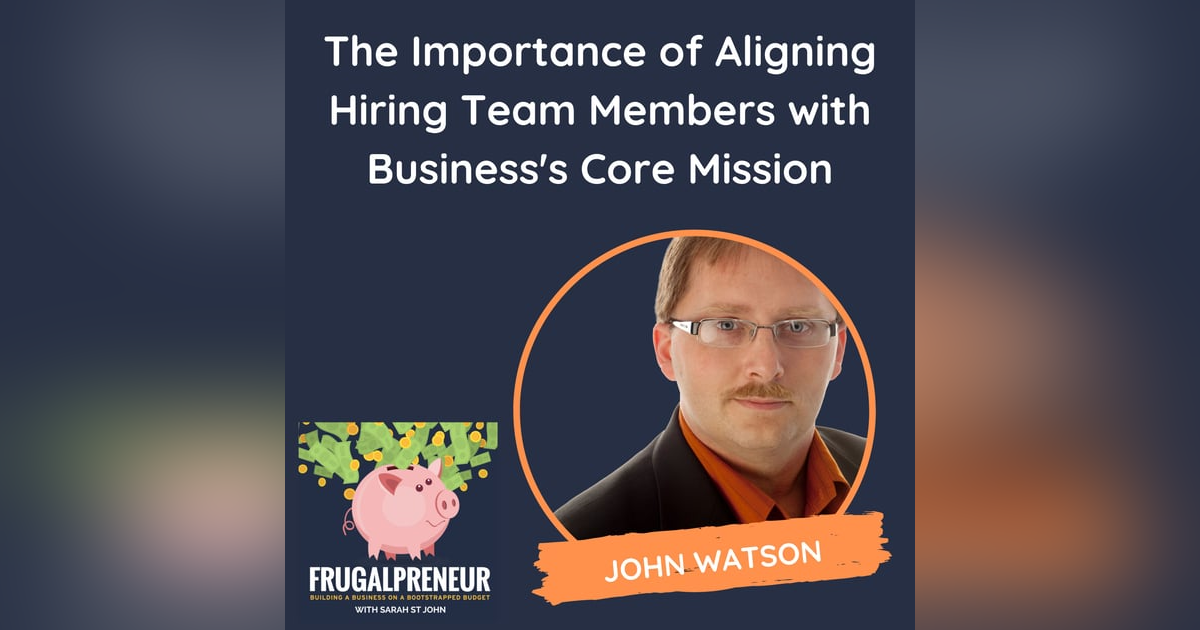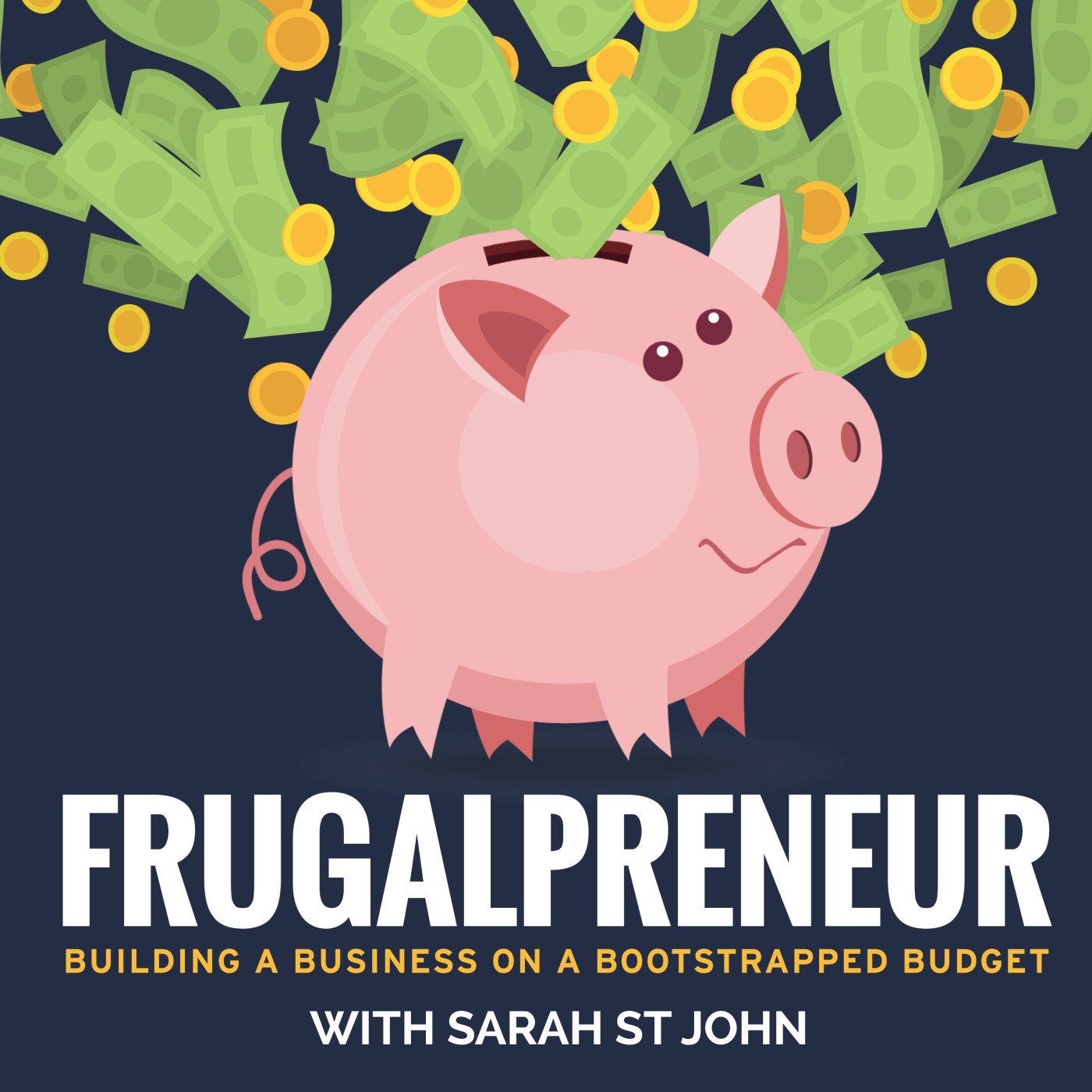The Importance of Aligning Hiring Team Members with Business's Core Mission (with John Watson)

This podcast episode serves as a showcase for a bootstrapped entrepreneur (John Watson) who shares invaluable insights into the realm of business initiation and growth. The primary focus is on the importance of having a clear understanding of one's target audience, which he identifies as vital for success. Throughout the conversation, we explore the nuances of establishing a virtual agency and the challenges faced in assembling a team aligned with the mission of serving small businesses. John reflects on both successes and setbacks, emphasizing the significance of strategic planning and collaboration with knowledgeable individuals to optimize resource allocation. Ultimately, this episode aims to provide actionable takeaways for listeners embarking on their own entrepreneurial journeys.
As the discussion unfolds, John shares critical lessons learned throughout the entrepreneurial process, particularly the importance of defining a clear market focus. This clarity not only shaped the agency's operational strategies but also influenced hiring practices, revealing the challenges encountered in attracting talent that is genuinely invested in serving small businesses. John reflects on the initial difficulties in assembling a team, noting that many prospective employees were drawn to the perceived prestige of larger clients, thus complicating recruitment efforts. This candid acknowledgment of setbacks serves as a reminder of the need for a cohesive team aligned with the agency's core values and mission.
The episode also offers listeners practical insights into the mechanics of bootstrapping, with John advocating for a lean operational model complemented by the strategic acquisition of external expertise. His emphasis on maintaining cost-effectiveness while ensuring quality service delivery highlights the delicate balance that must be struck in the early stages of a business. Additionally, John introduces his book, 'Being Profitable', which serves as a crucial roadmap for aspiring entrepreneurs, guiding them through the complexities of starting a business with an emphasis on strategic planning and effective resource management. Through this discussion, the podcast encapsulates a holistic perspective on the entrepreneurial journey, offering invaluable wisdom for those embarking on similar paths.
Takeaways:
- The podcast emphasizes the significance of having a clear vision of the target audience when bootstrapping a business.
- Listeners are encouraged to seek out knowledgeable individuals rather than relying on large consulting firms for support.
- John's experience illustrates the importance of understanding the logical sequence of business development processes.
- Failures in hiring practices can impede progress, highlighting the necessity of aligning team members with the business's core mission.
- Establishing a virtual agency can be a viable strategy for reducing overhead costs while maximizing flexibility.
- John presents a business development roadmap to assist new entrepreneurs in navigating their initial challenges effectively.
00:00 - Untitled
00:44 - Untitled
01:18 - Introduction to Showcase Episodes
01:56 - Starting My Own Company
03:31 - Understanding the Challenges of Team Building in Small Business
04:10 - The Journey of Starting a Business
06:21 - Resources for Startups
Welcome to the Frugalpreneur podcast. I am your host, Sarah St. John.This episode is what I refer to as a showcase episode where I feature a bootstrapped entrepreneur and they briefly share their tips, tricks, tactics, techniques and tools that help them bootstrap their business and the successes and failures along the way.My hope is that each of these showcase episodes will provide at least one valuable takeaway that you can implement with right away in your own bootstrap business journey. Now onto the episode.
John WatsonMy background is in consulting. I've been a consultant ever since I started way back 30 years ago. And I was always working with bigger firms.The emphasis was always on bigger companies, bigger projects, keeping people busy. The pace was slow, it was political, I didn't care for it.What I found that I really liked was working with small business owners where I could deal directly with the founder, someone who was eager to go fast, could make decisions far less political, someone who I could collaborate with and really make a difference in their business. And so I really couldn't find a place to do that. So I started my own company in order to be able to focus on the audience that I wanted to serve.When I started Accrue, it was my third business that I had started, so I already had a reputation in the marketplace. I had preexisting clients that stayed with me. Once I left the agency, I had to wait two months for non compete to go complete.But the majority of the clients I was working with came along with me and that provided me with the cash flow to be able to finance my setup and really get going conservatively. But I decided at the same time that I didn't want to set up another office.I want to do to really start a virtual agency and work with people from all around the world that wanted to do the same. And so the bootstrapping largely was setting up the infrastructure to support that. And this was 19 years ago, so wasn't quite as easy as it is now.But set up the infrastructure to support team collaboration and really kept the business fairly lean.We set up a website and, you know, work with existing clients for the first year until we were able to ramp up and start serving a larger customer base. I think the biggest success in bootstrapping my business was really knowing who we want to serve.We had a very clear picture of the target audience and how we wanted to show up for them, which was different than the classic agency model. We wanted to be more of a coaching consultant, specifically working with small businesses.And so the real success was knowing who we wanted to work with and sticking with that. And I would say that's also the failure is we. We didn't realize how few people wanted that.We had a really difficult time hiring people who wanted to serve that audience. The desire seemed to be, I want to work with big companies, get the big reputation, pad my resume with all kinds of fancy experience.And so we struggled for quite a while to find. I think the failure is not really screening our team well enough initially for people who legitimately wanted to work with small businesses.We had several false starts with people that had the skills but really didn't have the interest. And I think the failure is in being impatient and needing people and not being as careful as we could have been with our selection process.And that set us back. I think the main thing we did well was having a solid plan before we started. This is the third business we started.We had a pretty good idea of what we wanted to do. We. We didn't reach out to big companies to support us.We really went to, you know, our own team largely, and a group of independent consultants and coaches were affordable who really would collaborate with us and guide us in the way that we needed to be guided to do a lot of the work ourselves and to get really good help from individuals.I think that was probably the most useful thing for bootstrapping, was keeping our costs down, doing the right things in the right order for one, but also really seeking people who knew what they were doing that weren't part of a large, costly sort of overhead kind of company who could really get down in the trenches with us and help us do all the things that we needed to do and do them well and do them in the right order. It made a big difference.I found when I started my first business was really struggled to understand the process of what I was getting into, that there was a logical sequence to follow. I sought all kinds of advice from creating coaches, consultants and agencies and mentors, you name it. I reached out and asked for help.And I really struggled to find people who really wanted to help me as opposed to just sell me stuff.So one of the things that when we started our business, we wanted to create a product to create a service and a product that really was about showing up for people and getting the kind of help and support that we wanted when we first started. And so to that end, I wrote a book called Being Profitable.It's a business development roadmap, sort of a travel guide sort of style to really help people who are just getting started in business who don't fully appreciate the process that they're getting into. Sort of the order of operations and what are they getting into. So the book is really the biggest offer we have.The most useful thing really to help people bootstrap effectively by not largely by not wasting money and doing the right things in the right order, the right way, with the right help and not trying to do it all themselves, but having the expertise, having an understanding of what they need to do and be able to communicate effectively to suppliers. To really not waste time and resources spinning your wheels doing even. Even doing the right things in the wrong order is problematic.We also have a 19 free ebooks that we pull together for startups as well in order to try to head them off, give them the resources and information that they need to do a good start. So you can get that information at our website which is accruemarketing.com I hope.
Sarah St JohnYou enjoyed that episode and were able to take away a valuable nugget of information that you can implement right away in your own business. If you feel your story would be valuable for the listeners of this show, please visit Frugal show guests.








